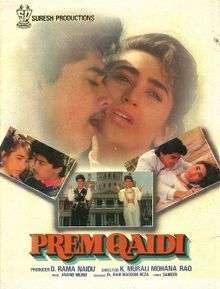Prem Qaidi
Prem Qaidi (Love Prisoner),[1] (Hindi: प्रेम क़ैदी) is 1991 Indian musical film written by and directed by K. Murali Mohan Rao. The film stars Karisma Kapoor, Harish Kumar, Paresh Rawal, Dalip Tahil, Asrani, Shafi Inamdar and Bharat Bhushan. The film was a remake of the 1990 Telugu film Prema Khaidi.
| Prem Qaidi प्रेम कैदी | |
|---|---|
 Theatrical release poster | |
| Directed by | K. Murali Mohan Rao |
| Produced by | D. Rama Naidu |
| Written by | Dialogue: Dr. Rahi Masoom Reza |
| Story by | Paruchuri Brothers |
| Based on | Telugu film Prema Khaidi by E. V. V. Satyanarayana |
| Starring |
|
| Music by | Anand-Milind |
| Cinematography | K. Ravindra Babu |
| Edited by |
|
Production company | |
Release date |
|
| Country | India |
| Language | Hindi |
Background
The film was a remake of the 1990 Telugu film Prema Khaidi, by E. V. V. Satyanarayana, and marked the feature film debut of actress Karishma Kapoor,[2][3] as the first female star from the Kapoor family allowed to enter the film industry.[4] Karishma Kapoor was only 16 when acting in this film, which was how she made her debut, while her co star Harish Kumar was only 15.[5]
Plot
In bad fortune, while saving his employer Kasturi Prasad's (Dalip Tahil) life, Suryanath (Bharat Bhushan) loses his legs. In appreciation, Kasturi allows Chandra Mohan (Harish Kumar), Suryanath's son, to work in his home. Kasturi's daughter Neelima (Karisma Kapoor) initially makes fun of and teases Chandra, but soon falls in love with him. Kasturi is against this affair and sends henchmen to attack Chandra, which results in their murdering Suryanath during the melee. Young Chandra is convicted of the crime and is sent to a youth detention center as a punishment. The head jailer tortures Chandra, but center Superintendent Prabhavati (Rama Vij) understands his emotions and love for Neelima and intercedes. She tries to reunite the two lovers.
Cast
- Bharat Bhushan as Suryanath (Chandra Mohan's Father)
- Karishma Kapoor as Neelima
- Harish Kumar as Chandra Mohan
- Paresh Rawal as Prabhavati's Husband
- Dalip Tahil as Kasturi Prasad (Neelima's Father)
- Rama Vij as Superintendent Prabhavati
- Shafi Inamdar as Jailer
- Harish Patel as Kasturi's Henchman
- J.D. Chakravarthy as Prabhavati's son
- Anjana Mumtaz as Neelima's Mother
- Asrani as Pandit
- Ali as Prisoner in Youth Detention Center
- Narsing Yadav as Driver
- Rajitha as Neelima's friend
Soundtrack
| # | Title | Singer(s) |
|---|---|---|
| 1 | "Antakshari" | S.P. Balasubramaniam, Kavita Krishnamurthy, Kishore Kumar, Asha Bhonsle |
| 2 | "Arey Logo Zara Dekho" | S.P. Balasubramaniam, Kavita Krishnamurthy |
| 3 | "Hum Hain Premqaidi" | S.P. Balasubramaniam, Kavita Krishnamurthy, Abhijeet Bhattacharya |
| 4 | "I Live For You" | S.P. Balasubramaniam, Kavita Krishnamurthy |
| 5 | "Priyatama O Meri Priyatama" | S.P. Balasubramaniam, Sadhana Sargam |
| 6 | "Tere In Galon Pe" | S.P. Balasubramaniam, Kavita Krishnamurthy |
References
- Derné, Steve (2000). Movies, Masculinity, and Modernity: An Ethnography of Men's Filmgoing in India. Contributions in Sociology. ISSN 0084-9278. GREENWOOD Publishing Group Incorporated. ISBN 9780313312878. Retrieved 25 May 2014.
- Bhawana Sommya; Jigna Kothari; Supriya Madangarli (2013). Mother Maiden Mistress. HarperCollins Publishers. ISBN 978-9350294857.
- Thakkar, Mehul S (18 May 2012). "I was confident of Prem Qaidi: Karisma Kapur". Times of India. Retrieved 24 May 2014.
- Bajaj, J.K. (2014). On & Behind the Indian Cinema. Diamond Pocket Books Pvt Ltd. pp. 1994, 2008. ISBN 978-9350836217.
- Jain, Madhu (2009). Kapoors: The First Family of Indian Cinema. Penguin UK. ISBN 9788184758139.
External links
- Prem Qaidi on IMDb